 (source)
(source)
|
George Gaylord Simpson
(16 Jun 1902 - 6 Oct 1984)
American paleontologist whom Stephen Jay Gould described as “one of the most important architects of the synthesis. He engineered the marriage of paleontology with genetics and more broadly with the rest of evolutionary biology.”
|
Science Quotes by George Gaylord Simpson (27 quotes)
“Exobiology” … that peculiar science has no known subject matter.
— George Gaylord Simpson
In The Meaning of Evolution: A Study of the History of Life and of Its Significance for Man (Rev. Ed., 1967), 10, footnote.
A rill in a barnyard and the Grand Canyon represent, in the main, stages of valley erosion that began some millions of years apart.
— George Gaylord Simpson
Uniformitarianism. An Inquiry into Principle, Theory, and Method in Geohistory and Biohistory', M. K. Hecht and W. C. Steere (eds.), Essays in Evolution and Genetics in Honor of Theodosius Dobzhansky (1970), 83.
As far as we know in the universe, man is unique. He happens to represent the highest form of organization of matter and energy that has ever appeared.
— George Gaylord Simpson
In The Meaning of Evolution (Rev.Ed. 1967), 345.
Because intelligence is our own most distinctive feature, we may incline to ascribe superior intelligence to the basic primate plan, or to the basic plan of the mammals in general, but this point requires some careful consideration. There is no question at all that most mammals of today are more intelligent than most reptiles of today. I am not going to try to define intelligence or to argue with those who deny thought or consciousness to any animal except man. It seems both common and scientific sense to admit that ability to learn, modification of action according to the situation, and other observable elements of behavior in animals reflect their degrees of intelligence and permit us, if only roughly, to compare these degrees. In spite of all difficulties and all the qualifications with which the expert (quite properly) hedges his conclusions, it also seems sensible to conclude that by and large an animal is likely to be more intelligent if it has a larger brain at a given body size and especially if its brain shows greater development of those areas and structures best developed in our own brains. After all, we know we are intelligent, even though we wish we were more so.
— George Gaylord Simpson
In The Meaning of Evolution: A Study of the History of Life and of its Significance for Man (1949), 78.
Exobiology—a curious development in view of the fact that this “science” has yet to demonstrate that its subject matter exists!
— George Gaylord Simpson
In This View of Life: The World of the Evolutionist (1964), 254.
Human judgment is notoriously fallible and perhaps seldom more so than in facile decisions that a character has no adaptive significance because we do not know the use of it.
— George Gaylord Simpson
The Major Features of Evolution (1953), 166.
I am curious in a super-apish way. I like finding out things. That … is all that the “noble self-sacrificing devotion to truth” of 99-44/100% of all scientists amounts to—simple curiosity. That is the spirit in which nearly all productive scientific research is carried on.
— George Gaylord Simpson
Letter from London (20 Apr 1937), No. 81, in George Gaylord Simpson and Léo F. LaPorte (ed.), Simple Curiosity: Letters from George Gaylord Simpson to His Family, 1921-1970 (1987), 34.
I do not think evolution is supremely important because it is my specialty. On the contrary, it is my specialty because I think it is supremely important.
— George Gaylord Simpson
This View of Life: the World of an Evolutionist (1964), 27-28.
I learned, and later had to unlearn in order to become a scientist myself, that science is simply measurement and the answers are in print.
— George Gaylord Simpson
This View of Life: the World of an Evolutionist (1964), 27.
If in some madhouse there is a lunatic who still believes the old churchly tenet that heaven is up above, even this [the first manned landing on the moon] probably will not disabuse him. Surely those of us still sane enough to be at large realize that this event will have no more to so with theology, God, or self-knowledge than any flower we pluck or any hand we press—in fact, much less.
— George Gaylord Simpson
(13 Jul 1969). As given in Alan F. and Jason R. Pater (eds.), What They Said in 1969: The Yearbook of Spoken Opinion (1970), 402.
In summary, very large populations may differentiate rapidly, but their sustained evolution will be at moderate or slow rates and will be mainly adaptive. Populations of intermediate size provide the best conditions for sustained progressive and branching evolution, adaptive in its main lines, but accompanied by inadaptive fluctuations, especially in characters of little selective importance. Small populations will be virtually incapable of differentiation or branching and will often be dominated by random inadaptive trends and peculiarly liable to extinction, but will be capable of the most rapid evolution as long as this is not cut short by extinction.
— George Gaylord Simpson
Tempo and Mode in Evolution (1944), 70-1.
It is another aphorism that no one knows everything about anything. That need not dull the pleasure and fascination of the fact that a great deal is known about some things.
— George Gaylord Simpson
In Splendid Isolation (1980), 38.
It is still false to conclude that man is nothing but the highest animal, or the most progressive product of organic evolution. He is also a fundamentally new sort of animal and one in which, although organic evolution continues on its way, a fundamentally new sort of evolution has also appeared. The basis of this new sort of evolution is a new sort of heredity, the inheritance of learning. This sort of heredity appears modestly in other mammals and even lower in the animal kingdom, but in man it has incomparably fuller development and it combines with man's other characteristics unique in degree with a result that cannot be considered unique only in degree but must also be considered unique in kind.
— George Gaylord Simpson
In The Meaning of Evolution: A Study of the History of Life and of its Significance for Man (1949), 286.
Life arose as a living molecule or protogene, the progression from this stage to that of the ameba is at least as great as from ameba to man. All the essential problems of living organisms are already solved in the one-celled (or, as many now prefer to say, noncellular) protozoan and these are only elaborated in man or the other multicellular animals. The step from nonlife to life may not have been so complex, after all, and that from cell to multicellular organism is readily comprehensible. The change from protogene to protozoan was probably the most complex that has occurred in evolution, and it may well have taken as long as the change from protozoan to man.
— George Gaylord Simpson
The Meaning of Evolution: A Study of the History of Life and of its Significance for Man (1949), 16
Life is the most important thing about the world, the most important thing about life is evolution. Thus, by consciously seeking what is most meaningful, I moved from poetry to mineralogy to paleontology to evolution.
— George Gaylord Simpson
This View of Life: the World of an Evolutionist (1964), 27-28.
Man has risen, not fallen. He can choose to develop his capacities as the highest animal and to try to rise still farther, or he can choose otherwise. The choice is his responsibility, and his alone. There is no automatism that will carry him upward without choice or effort and there is no trend solely in the right direction. Evolution has no purpose; man must supply this for himself. The means to gaining right ends involve both organic evolution and human evolution, but human choice as to what are the right ends must be based on human evolution.
— George Gaylord Simpson
The Meaning of Evolution: A Study of the History of Life and of its Significance for Man (1949), 310.
Man is the result of a purposeless and natural process that did not have him in mind.
— George Gaylord Simpson
In The Meaning of Evolution (Rev.Ed. 1967), 345.
Nothing I then learned [in high school] had any bearing at all on the big and real questions. Who am I? What am I doing here? What is the world? What is my relationship to it?
— George Gaylord Simpson
This View of Life: the World of an Evolutionist (1964), 37.
Scientists and particularly the professional students of evolution are often accused of a bias toward mechanism or materialism, even though believers in vitalism and in finalism are not lacking among them. Such bias as may exist is inherent in the method of science. The most successful scientific investigation has generally involved treating phenomena as if they were purely materialistic, rejecting any metaphysical hypothesis as long as a physical hypothesis seems possible. The method works. The restriction is necessary because science is confined to physical means of investigation and so it would stultify its own efforts to postulate that its subject is not physical and so not susceptible to its methods.
— George Gaylord Simpson
The Meaning of Evolution: A Study of the History of Life and of its Significance for Man (1949), 127.
Scientists aren’t one tenth, nor one hundredth of one percent as silly as the asinine theory-hawking befuddlists who attack them.
— George Gaylord Simpson
Letter from London (20 Apr 1937), No. 81, in George Gaylord Simpson and Léo F. LaPorte (ed.), Simple Curiosity: Letters from George Gaylord Simpson to His Family, 1921-1970 (1987), 34.
The attempted synthesis of paleontology and genetics, an essential part of the present study, may be particularly surprising and possibly hazardous. Not long ago, paleontologists felt that a geneticist was a person who shut himself in a room, pulled down the shades, watched small flies disporting themselves in milk bottles, and thought that he was studying nature. A pursuit so removed from the realities of life, they said, had no significance for the true biologist. On the other hand, the geneticists said that paleontology had no further contributions to make to biology, that its only point had been the completed demonstration of the truth of evolution, and that it was a subject too purely descriptive to merit the name 'science'. The paleontologist, they believed, is like a man who undertakes to study the principles of the internal combustion engine by standing on a street corner and watching the motor cars whiz by.
— George Gaylord Simpson
Tempo and Mode in Evolution (1944), 1.
The meaning of human life and the destiny of man cannot be separable from the meaning and destiny of life in general. 'What is man?' is a special case of 'What is life?' Probably the human species is not intelligent enough to answer either question fully, but even such glimmerings as are within our powers must be precious to us. The extent to which we can hope to understand ourselves and to plan our future depends in some measure on our ability to read the riddles of the past. The present, for all its awesome importance to us who chance to dwell in it, is only a random point in the long flow of time. Terrestrial life is one and continuous in space and time. Any true comprehension of it requires the attempt to view it whole and not in the artificial limits of any one place or epoch. The processes of life can be adequately displayed only in the course of life throughout the long ages of its existence.
— George Gaylord Simpson
The Meaning of Evolution: A Study of the History of Life and of its Significance for Man (1949), 9.
The meaning that we are seeking in evolution is its meaning to us, to man. The ethics of evolution must be human ethics. It is one of the many unique qualities of man, the new sort of animal, that he is the only ethical animal. The ethical need and its fulfillment are also products of evolution, but they have been produced in man alone.
— George Gaylord Simpson
The Meaning of Evolution: A Study of the History of Life and of its Significance for Man (1949), 309.
The science of systematics has long been affected by profound philosophical preconceptions, which have been all the more influential for being usually covert, even subconscious.
— George Gaylord Simpson
The Major Features of Evolution (1953), 340.
The search for historical laws is, I maintain, mistaken in principle.
— George Gaylord Simpson
'Historical Science', C. C. Albritton (ed.), The Fabric of Geology (1963), 29.
The theory here developed is that mega-evolution normally occurs among small populations that become preadaptive and evolve continuously (without saltation, but at exceptionally rapid rates) to radically different ecological positions. The typical pattern involved is probably this: A large population is fragmented into numerous small isolated lines of descent. Within these, inadaptive differentiation and random fixation of mutations occur. Among many such inadaptive lines one or a few are preadaptive, i.e., some of their characters tend to fit them for available ecological stations quite different from those occupied by their immediate ancestors. Such groups are subjected to strong selection pressure and evolve rapidly in the further direction of adaptation to the new status. The very few lines that successfully achieve this perfected adaptation then become abundant and expand widely, at the same time becoming differentiated and specialized on lower levels within the broad new ecological zone.
— George Gaylord Simpson
Tempo and Mode in Evolution (1944), 123.
To put it crudely but graphically, the monkey who did not have a realistic perception of the tree branch he jumped for was soon a dead monkey—and therefore did not become one of our ancestors.
— George Gaylord Simpson
In This View of Life: The World of an Evolutionist (1963), 98.
Quotes by others about George Gaylord Simpson (1)
Can I pay any higher tribute to a man [George Gaylord Simpson] than to state that his work both established a profession and sowed the seeds for its own revision? If Simpson had reached final truth, he either would have been a priest or would have chosen a dull profession. The history of life cannot be a dull profession.
From 'G.G. Simpson, Paleontology, and the Modern Synthesis', collected in Ernst Mayr, William B. Provine (eds.), The Evolutionary Synthesis: Perspectives on the Unification of Biology (1998), 171.
See also:
- 16 Jun - short biography, births, deaths and events on date of Simpson's birth.
- George Gaylord Simpson: Paleontologist and Evolutionist, by Leo F. Laporte. - book suggestion.
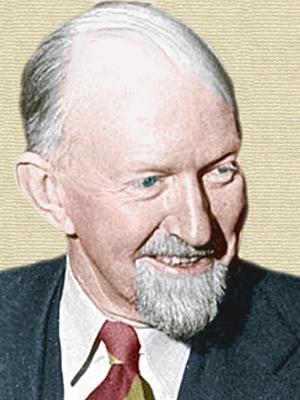
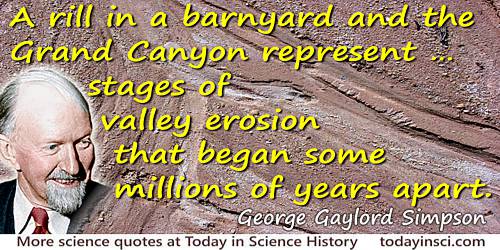
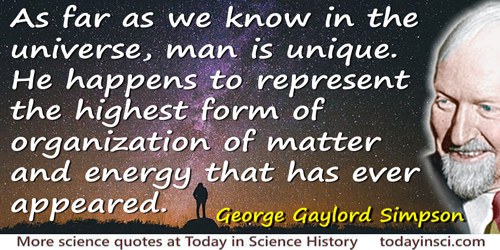
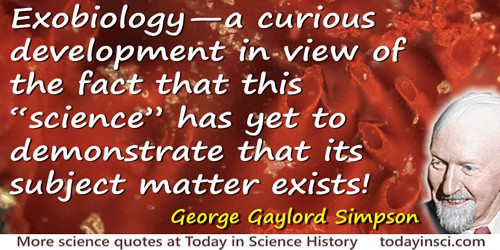
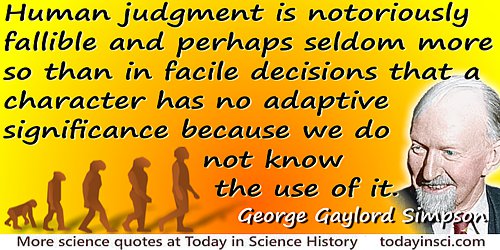
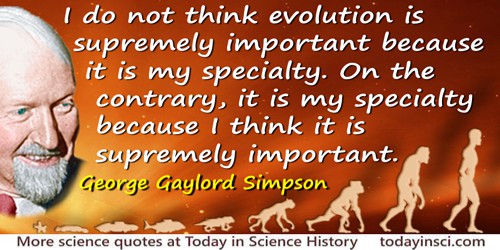


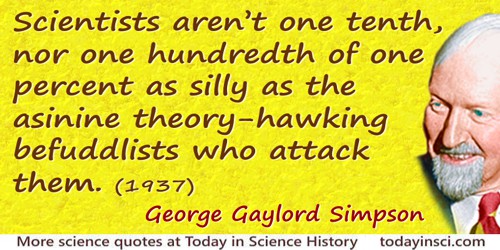

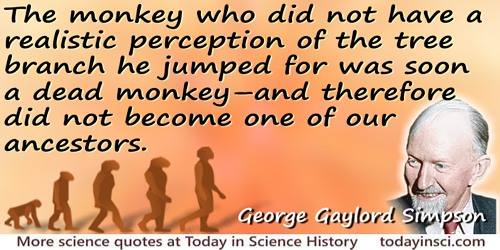
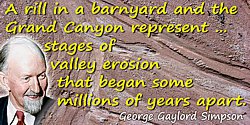
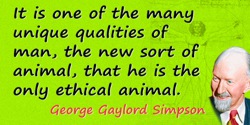

 In science it often happens that scientists say, 'You know that's a really good argument; my position is mistaken,' and then they would actually change their minds and you never hear that old view from them again. They really do it. It doesn't happen as often as it should, because scientists are human and change is sometimes painful. But it happens every day. I cannot recall the last time something like that happened in politics or religion.
(1987) --
In science it often happens that scientists say, 'You know that's a really good argument; my position is mistaken,' and then they would actually change their minds and you never hear that old view from them again. They really do it. It doesn't happen as often as it should, because scientists are human and change is sometimes painful. But it happens every day. I cannot recall the last time something like that happened in politics or religion.
(1987) -- 


